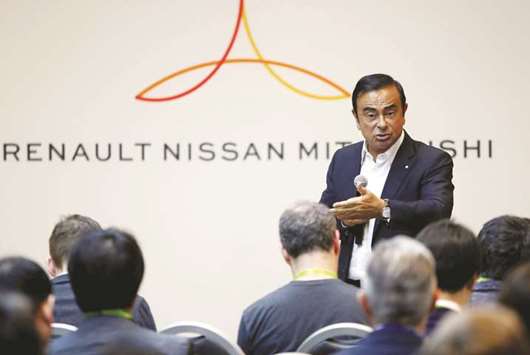Carlos Ghosn tamped down expectations of a quick deal to combine Nissan Motor Co and Renault SA, saying the spectre of failed mergers in his industry loomed large.
“I don’t think you’re going to see it this year or next,” Ghosn, who heads the Renault-Nissan-Mitsubishi alliance, said yesterday at Bloomberg’s Sooner Than You Think technology summit in Paris. “Lots of mergers collapse and destroy value – the strength of any company is the ability to motivate people, and how how are you going to do that if some of these people consider themselves second-class citizens.”
Renault and Nissan are discussing ways to strengthen their lopsided two-decade old alliance as the industry shifts to meet new challenges in an era of self-driving and electric vehicles.
The talks are delicate, with Nissan seeking to gain more influence in crucial operations such as product development, Bloomberg reported this month.
Ghosn recalled the example of the “marriage in heaven” merger of Daimler AG and Chrysler a decade ago that failed when the companies couldn’t find ways to effectively integrate. The pair are navigating their future as the payoff from the industry’s investments in these two technology areas remains uncertain.
While Ghosn predicted strong consumer demand for autonomous cars, the marketplace for electric vehicles is less clear with regulators rather than buyers behind the shift, he said.
The alliance was an early mover in electric vehicles with cars like Nissan’s Leaf and has sold the most battery-powered vehicles in the industry
to date.
“The shift to autonomous driving is so big an accident isn’t going to stop it,” the chairman and chief executive officer of the alliance, referring to incidents like the first known death caused by an autonomous test car. “It gives consumers the power to drive or not to drive.”
The collaborators plan to develop 15 models with autonomous features by 2022, including one fully self-driving vehicle.
In electric cars, Renault plans eight battery vehicles by 2022.
The tie-up’s current structure requires constant globetrotting among top staff and its cross-shareholding setup can be confusing to investors.
Ghosn and Nissan’s CEO Hiroto Saikawa, both 64, are keen to come to an agreement before they retire. Ghosn said yesterday that a merger is only one possibility as he seeks to forge deeper ties between the companies that will survive the alliance’s current generation of
management.
“This is something on which we need to bring a solution, and we need a solution that is specific,” he said. “Let’s try and find something that will reassure the stakeholders that this will continue, but at the same time maintain the identity” of each brand.
Coming to an agreement looks a tough battle with Saikawa publicly downplaying the need to merge while saying he wants to keep the alliance intact.
“I don’t think there is a resistance,” Ghosn said. “Let’s continue to work as a partner.”
The partnership has a byzantine structure with Nissan holding a 15% stake of Renault and no voting rights.
Renault, the smaller and less valuable partner, has 44% of Nissan and can vote on corporate matters.
In 2016, Ghosn added Mitsubishi Motors Corp to the mix after the company had been caught falsifying mileage estimates for several of its vehicles.
Further complicating matters, the French government owns 15% of Renault, making it the largest shareholder.

Carlos Ghosn, chairman and CEO of the Renault-Nissan-Mitsubishi Alliance, at a press conference in Las Vegas. The collaborators plan to develop 15 models with autonomous features by 2022, including one fully self-driving vehicle. In electric cars, Renault plans 8 battery vehicles by 2022.
